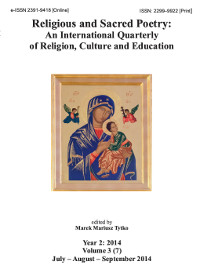Лирика «отца Солнышка»: «Какая мощь, как непостижимо велико усилие нести свет»
The Lyric Poetry of “Father Sun”: “What power, what inapprehensible great effort to carry light...”
Author(s): Nadiya Georgijivna KoloshukPublished by: Fundacja Naukowa Katolików »Eschaton«
Keywords: prison-camp lyric poetry; Yaroslav Lesiv (1945-1991); Y. Lesiv’s poetic legacy; religious world outlook; existential loneliness; Christian symbolism.
Summary/Abstract: The article deals with the poetic legacy of the Soviet dissident and longstanding prisoner and later Uniat priest Yaroslav Lesiv (1945 – 1991). It presents the outlook on life and the world of the believer and religious symbolism used in his lyric poetry. A considerable part of this lyric poetry was published posthumously. It is simple but refined in form and it sounds like a collection of prayers. Y. Lesiv’s lyric poetry reveals indisputable human and Christian values and Christian ethical postulates it expresses form an organic whole and cannot be doubted. Unfortunately, it’s impossible to analyze the formation of this world outlook now as all the published collections of Y. Lesiv’s lyric poetry differ both in composition and in manner of arrangement of texts, none of them is dated and none points to the sources from which the texts had been taken; in different editions there are substantial discrepancies. Obviously, it is necessary to do textual research based on archives. Y. Lesiv’s poetic work is multidimensional and requires repeated reading and critical interpretation. The aim of the article is an analysis of religious problems and of the connections between the figurative poetics and the author’s religious outlook. The methodological basis of the research is the raditional approach of literary history and methods of hermeneutic interpretation. The basic results of the research are the following observations and conclusions. Y. Lesiv’s poems create an impression of light, loving outlook up[on the world. Not knowing the author’s biography, one can hardly believe that the poems were written not only in imprisonment but in the hard conditions of living in the dark cell, of exhaustion and starvation after the tortures. Being physically imprisoned, the lyrical- hero acquires unlimited spiritual freedom. In Lesiv’s poetry are very few details of prison-camp reality or even mentions concerning the prison, although when they appear, they are very meaningful. But unexpected associations of the objects or circumstances of the reality with symbols and signs of God’s presence in the world appear. In the poems. The motifs of existential loneliness sometimes sound stoical, but on other occasions they are permeated with aching grief. Y. Lesiv’s modest poetic legacy deserves comparison with the legacy of great Christian poets and there is nothing in the Ukrainian literature with which we can Y. Lesiv’s work can be compared, except the lyrical prayer poetry of the baroque epoch. In the 20th century this tradition was not recalled and it was basically ignored. At present, however, it is very important.
Journal: Religious and Sacred Poetry: An International Quarterly of Religion, Culture and Education
- Issue Year: 2014
- Issue No: 3
- Page Range: 63-82
- Page Count: 20

